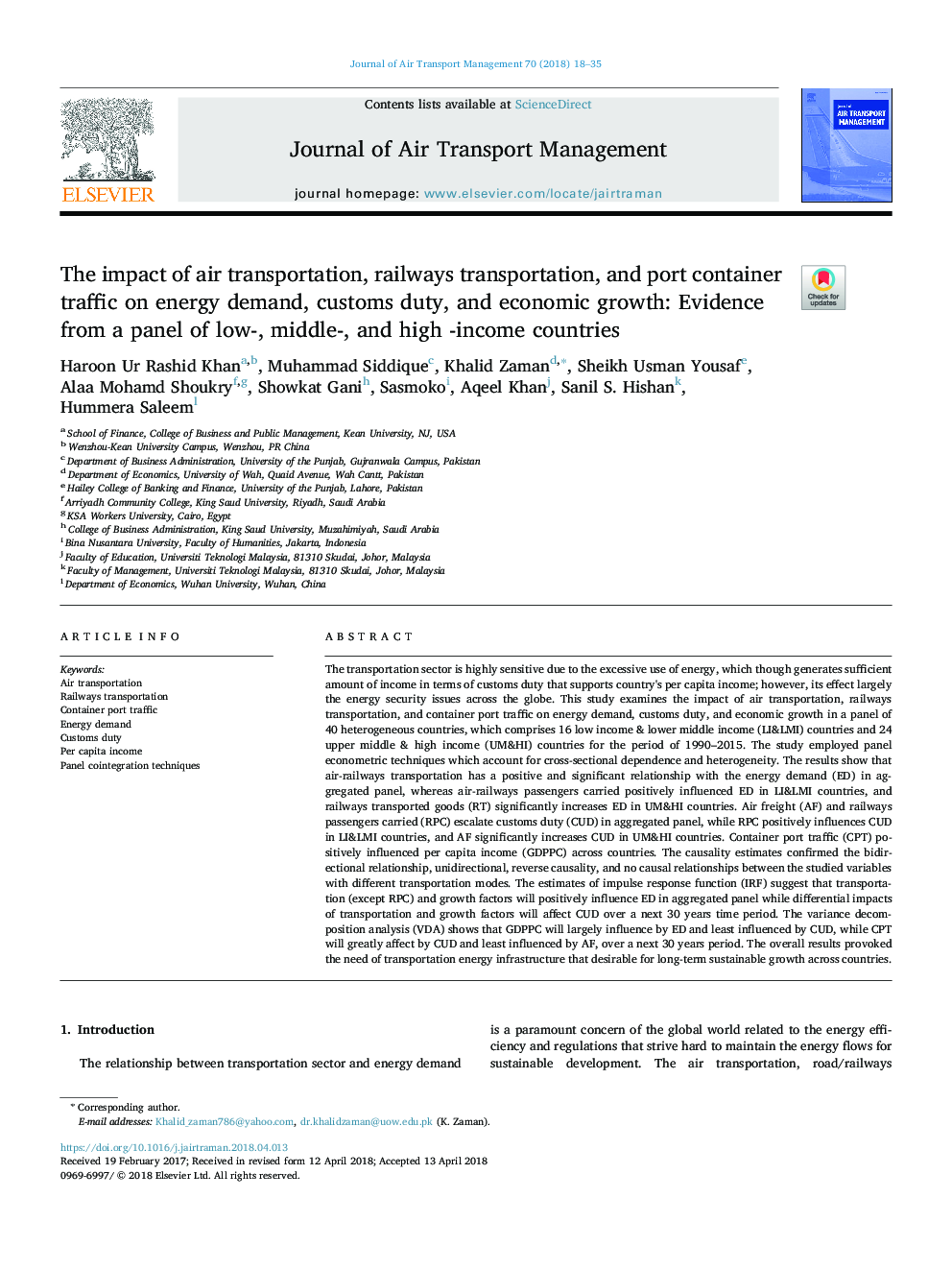| کد مقاله | کد نشریه | سال انتشار | مقاله انگلیسی | نسخه تمام متن |
|---|---|---|---|---|
| 7435070 | 1483550 | 2018 | 18 صفحه PDF | دانلود رایگان |
عنوان انگلیسی مقاله ISI
The impact of air transportation, railways transportation, and port container traffic on energy demand, customs duty, and economic growth: Evidence from a panel of low-, middle-, and high -income countries
ترجمه فارسی عنوان
تأثیر حمل و نقل هوایی، حمل و نقل ریلی و ترافیک کانتینری پورتال بر تقاضای انرژی، گمرکات و رشد اقتصادی: شواهد حاصل از یک گروه از کشورهای کم درآمد، متوسط و با درآمد بالا
دانلود مقاله + سفارش ترجمه
دانلود مقاله ISI انگلیسی
رایگان برای ایرانیان
کلمات کلیدی
حمل و نقل هوایی، حمل و نقل راه آهن، ترافیک بندر کانتینر، تقاضای انرژی، گمرکی درآمد سرانه، تکنیک های تلفیقی پنل،
موضوعات مرتبط
علوم انسانی و اجتماعی
مدیریت، کسب و کار و حسابداری
استراتژی و مدیریت استراتژیک
چکیده انگلیسی
The transportation sector is highly sensitive due to the excessive use of energy, which though generates sufficient amount of income in terms of customs duty that supports country's per capita income; however, its effect largely the energy security issues across the globe. This study examines the impact of air transportation, railways transportation, and container port traffic on energy demand, customs duty, and economic growth in a panel of 40 heterogeneous countries, which comprises 16 low income & lower middle income (LI&LMI) countries and 24 upper middle & high income (UM&HI) countries for the period of 1990-2015. The study employed panel econometric techniques which account for cross-sectional dependence and heterogeneity. The results show that air-railways transportation has a positive and significant relationship with the energy demand (ED) in aggregated panel, whereas air-railways passengers carried positively influenced ED in LI&LMI countries, and railways transported goods (RT) significantly increases ED in UM&HI countries. Air freight (AF) and railways passengers carried (RPC) escalate customs duty (CUD) in aggregated panel, while RPC positively influences CUD in LI&LMI countries, and AF significantly increases CUD in UM&HI countries. Container port traffic (CPT) positively influenced per capita income (GDPPC) across countries. The causality estimates confirmed the bidirectional relationship, unidirectional, reverse causality, and no causal relationships between the studied variables with different transportation modes. The estimates of impulse response function (IRF) suggest that transportation (except RPC) and growth factors will positively influence ED in aggregated panel while differential impacts of transportation and growth factors will affect CUD over a next 30 years time period. The variance decomposition analysis (VDA) shows that GDPPC will largely influence by ED and least influenced by CUD, while CPT will greatly affect by CUD and least influenced by AF, over a next 30 years period. The overall results provoked the need of transportation energy infrastructure that desirable for long-term sustainable growth across countries.
ناشر
Database: Elsevier - ScienceDirect (ساینس دایرکت)
Journal: Journal of Air Transport Management - Volume 70, July 2018, Pages 18-35
Journal: Journal of Air Transport Management - Volume 70, July 2018, Pages 18-35
نویسندگان
Haroon Ur Rashid Khan, Muhammad Siddique, Khalid Zaman, Sheikh Usman Yousaf, Alaa Mohamd Shoukry, Showkat Gani, Sasmoko Sasmoko, Aqeel Khan, Sanil S. Hishan, Hummera Saleem,
